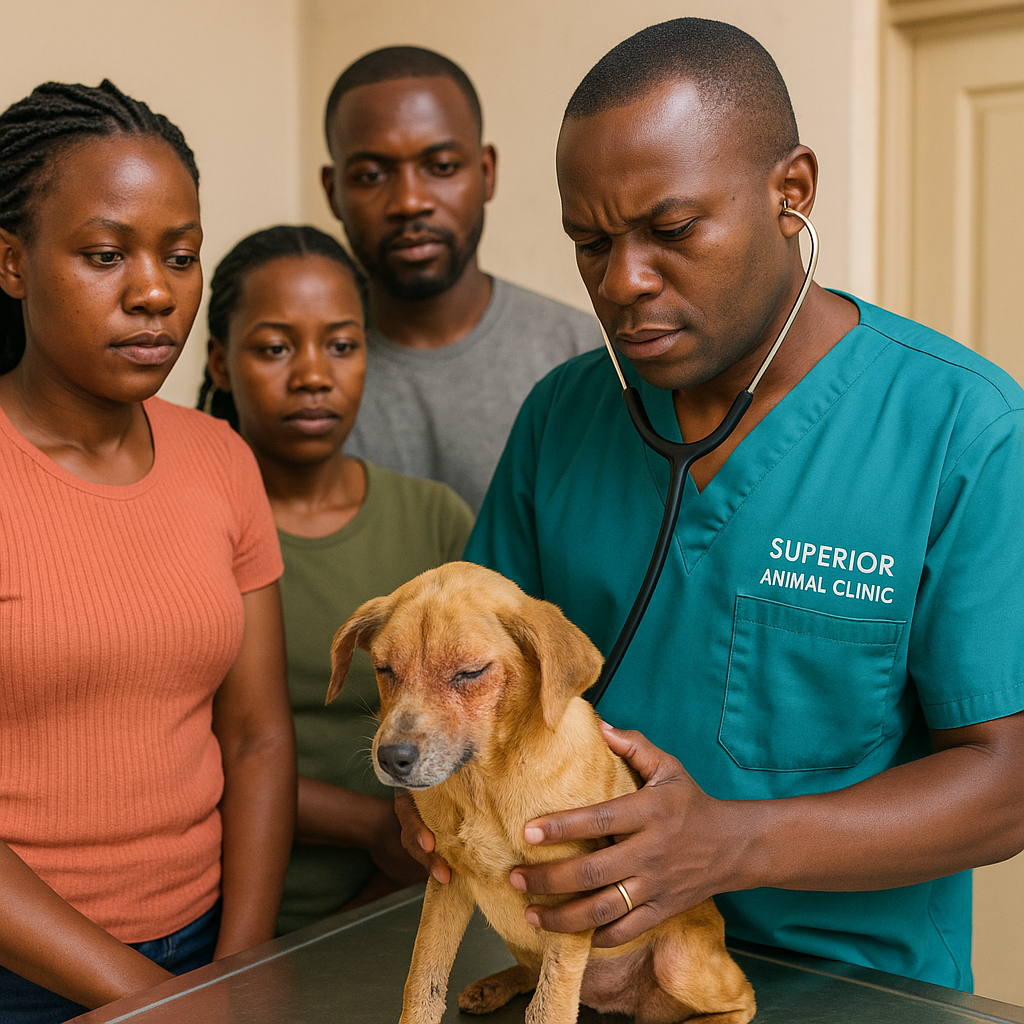
Last month, a worried dog owner from Muyenga rushed into Superior Animal Clinic, Makindye with her 5-month-old puppy, Rocky. He had stopped eating, was sneezing non-stop, and had thick discharge from his eyes and nose. She thought it was just a cold — until Rocky started twitching and became too weak to stand.
When we ran tests, the results confirmed canine distemper, one of the most dangerous viral diseases affecting dogs in Kampala and across Uganda. Sadly, many dog owners mistake its early signs for a simple flu — and by the time they seek help, it’s often advanced.
We were able to stabilize and treat Rocky through supportive therapy, and after several weeks of dedicated care, he made a full recovery. His story is one of many we see daily from Ntinda, Nsambya, Katwe, Rubaga, Munyonyo, Ndejje, Lubowa, Nakawa, and other areas in and around Kampala.
So, what exactly causes canine distemper in dogs? How can you prevent it? And where can you find the best veterinary clinic in Kampala for canine distemper treatment? Let’s break it down — simply, clearly, and with all the answers every dog owner in Uganda needs to know.
🧬 What Is Canine Distemper?
Canine distemper is a highly contagious viral disease caused by the Canine Distemper Virus (CDV) — a close relative of the measles virus in humans. It attacks a dog’s respiratory, digestive, and nervous systems, leading to serious illness or even death if not treated early.
The disease is especially common in unvaccinated puppies and stray dogs in Kampala and surrounding areas.
Common Causes of Canine Distemper in Uganda
Many dog owners in Kampala are often shocked when their healthy-looking puppy suddenly falls sick with canine distemper — a deadly virus that spreads quietly but aggressively among dogs. To protect your pet, it’s important to understand what actually causes canine distemper and how it spreads across communities like Makindye, Muyenga, Nsambya, Katwe, Rubaga, Ntinda, and Ndejje.
Here’s a breakdown of the most common causes we see at Superior Animal Clinic:
1. 🦠 Lack of Vaccination
This is by far the leading cause of canine distemper in Uganda.
Many dog owners delay or skip their dog’s distemper vaccination (DHPP), either due to cost, busy schedules, or lack of awareness. Puppies that are not vaccinated between 6 to 16 weeks of age are highly vulnerable.
Because distemper spreads through the air and contact with infected dogs, even one missed vaccine can leave your dog unprotected. At Superior Animal Clinic, we see most distemper cases in dogs that have never been vaccinated or missed their booster shots.
2. 🐕🦺 Contact with Infected Dogs or Stray Dogs
In Kampala, many areas like Katwe, Zana, and Rubaga have high populations of stray dogs. These strays often carry the canine distemper virus (CDV) and can transmit it through coughing, sneezing, or sharing contaminated bowls.
Even a friendly sniff during a walk can expose your dog to the virus.
The disease is airborne, meaning your dog doesn’t have to directly touch another infected animal — just being near one is enough to catch the virus.
3. Poor Hygiene and Unsanitary Living Conditions
In areas with dusty compounds, shared kennels, or poor drainage, the virus can survive longer in the environment.
When food and water bowls are not cleaned properly, or when bedding is rarely washed, the virus can linger and spread to other dogs in the home.
That’s why we always emphasize at Superior Animal Clinic: keeping your dog’s living area clean is just as important as vaccination.
4. Poor Nutrition and Weak Immunity
Dogs that are poorly fed or malnourished have weakened immune systems, making them easy targets for distemper.
In Kampala, we often see this in rescue dogs, puppies, or dogs that feed mainly on household leftovers.
A balanced diet rich in protein, vitamins, and minerals helps your dog’s immune system fight off infections more effectively.
5. 🐾 Overcrowded Kennels and Animal Shelters
Distemper spreads extremely fast in densely packed environments like kennels, breeding centers, or shelters where many dogs live together.
In such places, one infected dog can infect dozens of others within days.
This is common in rescue shelters around Kampala and Mityana that take in stray dogs. We recommend routine distemper vaccination campaigns for such facilities to prevent outbreaks.
6. Weather Conditions and Sudden Temperature Changes
Uganda’s tropical climate can also play a role. During the rainy season, dogs are exposed to damp, cold conditions which weaken their immunity.
Many cases we see at Superior Animal Clinic spike after prolonged rain — especially in low-lying, humid areas like Makindye, Nsambya, and Lubowa.
While the weather doesn’t cause the virus itself, it creates perfect conditions for infection when a dog’s body defenses are low.
7. Exposure to Wild Animals or Unvaccinated Pets
In semi-urban and rural edges of Kampala like Ndejje, Seguku, and Mityana, domestic dogs often come into contact with wild canines (foxes) or unvaccinated dogs from neighboring homes.
These animals can act as silent carriers of the distemper virus, passing it on without showing immediate signs.
8. Lack of Regular Veterinary Check-ups
Many dog owners wait until their dog is seriously ill before visiting a vet. Unfortunately, by then, the distemper virus has already caused severe damage.
Regular vet check-ups at Superior Animal Clinic allow early detection of symptoms like fever, nasal discharge, or eye inflammation — before the disease becomes critical.
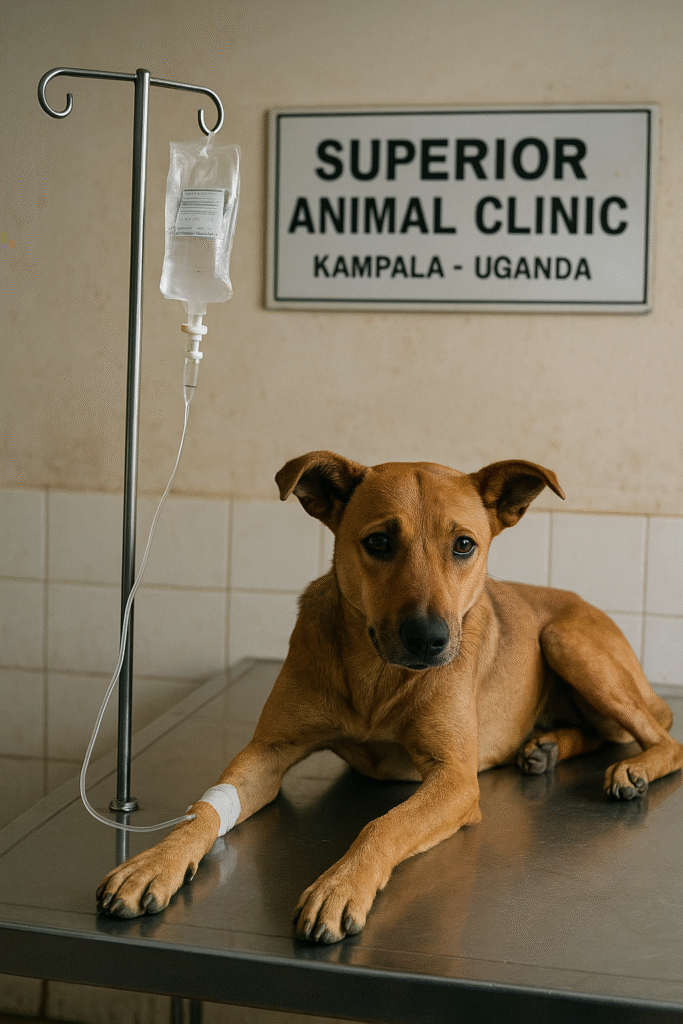
💡 Quick Summary
| Main Cause | Explanation | Common Kampala Areas Affected |
| Lack of Vaccination | Puppies or adult dogs not vaccinated | Makindye, Katwe, Ndejje, Zana |
| Contact with Strays | Airborne virus from infected dogs | Rubaga, Katwe, Kasubi |
| Poor Hygiene | Dirty living conditions | Nsambya, Nakawa, Muyenga |
| Malnutrition | Weak immune system | Mityana, Ndejje |
| Overcrowded Kennels | Close contact among dogs | Rescue centers across Kampala |
| Cold & Wet Weather | Low immunity during rainy seasons | Lubowa, Makindye, Nsambya |
| Wild Animal Exposure | Transmission from wild canines | Mityana, Seguku |
| Lack of Vet Visits | Missed early signs | All areas of Kampala |
🐶 In Short
Most canine distemper cases in Uganda are 100% preventable through vaccination, hygiene, and proper nutrition.
If you live in Kampala or nearby towns, the best way to protect your dog is to visit Superior Animal Clinic, Makindye for timely distemper vaccination, screening, and preventive care.
Our team handles hundreds of distemper cases each year — and we’re here to help keep your furry friend safe, strong, and virus-free.
🧫 Types of Canine Distemper Commonly Seen in Uganda
At Superior Animal Clinic, we commonly treat these types:
- Respiratory Distemper – Causes coughing, nasal discharge, and breathing difficulties.
- Gastrointestinal Distemper – Leads to vomiting, diarrhea, and dehydration.
- Neurological Distemper – The most severe form, causing seizures, paralysis, and head twitching.
- Ocular Distemper – Involves eye inflammation and discharge.
Symptoms of Canine Distemper in Dogs in Uganda
Recognizing the early signs of canine distemper can be the difference between life and death for your dog. Many dog owners in Kampala often bring their dogs to Superior Animal Clinic thinking it’s just a cold or a stomach infection. But by the time distemper shows its full signs, it’s already affecting several organs.
Canine distemper progresses in stages, and symptoms can vary depending on the dog’s age, immunity, and how far the infection has spread. Let’s go through the common signs one by one so you know what to watch for 👇
1. Early (Respiratory) Stage – The “Cold-Like” Phase
This is where most dog owners mistake distemper for a normal flu.
Common symptoms include:
- Clear or yellow discharge from the eyes and nose
- Sneezing and frequent coughing
- Mild fever (often going unnoticed)
- Lethargy or sleeping more than usual
- Loss of appetite
At this stage, the virus attacks the dog’s respiratory system, just like a severe cold. It’s the best time to visit a vet — because early treatment at Superior Animal Clinic can prevent it from advancing further.
2. Gastrointestinal Stage – The Digestive System Is Affected
If untreated, the virus spreads to the stomach and intestines, leading to:
- Persistent vomiting
- Watery or bloody diarrhea
- Severe dehydration
- Weight loss and poor appetite
- Weakness or dull coat
Dogs from areas like Katwe, Nsambya, and Zana — where many unvaccinated puppies are exposed to stray dogs — often reach this stage before owners realize it’s distemper. If your dog vomits or has continuous diarrhea for more than a day, seek veterinary care immediately.
3. Neurological Stage – The Nervous System Breakdown
This is the most dangerous and heartbreaking phase of canine distemper.
The virus reaches the brain and spinal cord, leading to:
- Seizures or sudden jerking movements
- Head twitching or tilting
- Circling or confusion
- Difficulty walking or paralysis
- Unusual crying or whining due to nerve pain
At Superior Animal Clinic, we often see dogs from Munyonyo, Rubaga, Lubowa, and Ndejje in this stage — often because early signs were missed. Intensive care can still help, but neurological symptoms sometimes remain even after recovery.
4. Eye and Skin Changes
Canine distemper also affects a dog’s eyes, skin, and nose:
- Thick eye discharge (often sticky and yellowish)
- Cloudiness in the eyes (sign of possible blindness)
- Hardening or cracking of paw pads and nose (known as “hard pad disease”)
- Skin rashes or dryness
If your dog’s nose suddenly becomes hard and cracked or their paws feel rough and thick, it could be a clear warning sign of distemper.
5. Behavioral and General Signs
Distemper doesn’t only affect a dog physically — it also changes their behavior and energy. You might notice:
- Unusual aggression or withdrawal
- Lack of coordination or confusion
- Crying, whining, or sensitivity to touch
- Loss of interest in play or food
- Weakness even after eating
In many Kampala homes, dog owners report that their pets “just stopped being active” or “started sleeping all the time.” That’s often the first sign something serious is happening internally.
When to See a Vet
If your dog shows even one or two of these symptoms, don’t wait.
Visit Superior Animal Clinic in Makindye right away for:
- Proper diagnosis using blood tests and clinical examination
- Supportive treatment to stop the disease from spreading
- Fluids, antibiotics, and immune boosters to save your dog’s life
Remember, canine distemper has no direct cure, but with early diagnosis and expert care, your dog can recover and live a healthy, happy life.
Key Takeaway
👉 If your dog has eye or nose discharge, coughs, vomits, has diarrhea, seizures, or acts weak, don’t assume it’s just a flu.
Best Treatment and Drugs for Canine Distemper in Uganda
When your dog is diagnosed with canine distemper, time is everything. The earlier you visit a trusted vet clinic like Superior Animal Clinic in Makindye, Kampala, the higher your dog’s chances of recovery.
Unfortunately, there is no single drug that kills the distemper virus — treatment focuses on supporting your dog’s body, boosting immunity, and managing symptoms while the immune system fights off the virus.
At Superior Animal Clinic, our experienced veterinarians follow a detailed and personalized approach for each case of distemper. Here’s how we treat it step by step 👇
Step 1: Accurate Diagnosis
Before starting treatment, our vets run clinical tests and blood analyses to confirm the presence of the Canine Distemper Virus (CDV) and to rule out other diseases like parvovirus or bacterial pneumonia.
Once confirmed, we immediately begin isolation and supportive therapy to protect other dogs from infection.
Step 2: Fluid and Electrolyte Therapy
Most dogs with distemper suffer from vomiting, diarrhea, and dehydration. We provide IV (intravenous) fluid therapy with balanced electrolytes to restore hydration, stabilize body temperature, and protect the kidneys and liver.
This step is critical — many dogs recover faster simply because their bodies stay hydrated and strong.
Step 3: Controlling Secondary Infections
Because distemper weakens the immune system, dogs become prone to bacterial infections like pneumonia, bronchitis, or skin infections.
Our vets use broad-spectrum antibiotics such as Amoxicillin-clavulanate, Doxycycline, or Ceftriaxone (based on the case) to prevent these infections from worsening.
Step 4: Managing Nervous System Symptoms
In advanced cases, dogs may show tremors, seizures, or paralysis. At Superior Animal Clinic, we use anticonvulsants such as Diazepam or Phenobarbital to control these episodes and reduce brain inflammation.
We also administer neuroprotective vitamins (like B-complex and Vitamin E) to help the brain heal.
Step 5: Boosting Immunity and Energy
The stronger your dog’s immune system, the better its recovery.
We use immune boosters, vitamin C injections, and nutritional supplements such as Omega-3, iron tonics, and probiotics to help the dog regain strength.
For weak or anorexic dogs, we provide high-energy nutritional paste or syringe feeding to keep them nourished.
Step 6: Respiratory and Eye Care
Dogs with distemper often develop coughing, nasal discharge, and eye infections.
We use:
- Steam inhalation therapy to clear airways
- Eye drops or antibiotic ointments to prevent conjunctivitis
- Expectorants or mucolytics to ease breathing
This makes the dog more comfortable while fighting the infection.
Step 7: Specialized Feeding & Nutritional Support
Proper feeding is vital for recovery.
At Superior Animal Clinic, we recommend:
- Warm, soft, easy-to-digest meals (boiled chicken, pumpkin, rice, or fish)
- Glucose water or diluted broth for hydration
- Avoiding hard kibble, bones, or raw foods during illness
If your dog cannot eat, we offer nutritional drips and assisted feeding until appetite returns.
❤️ Step 8: Continuous Monitoring and Follow-Up
Canine distemper can take several weeks to recover from. Our vets at Superior Animal Clinic monitor every patient closely for temperature, breathing, and neurological progress.
We adjust medication and diet daily based on your dog’s improvement.
We also guide owners on home care, hygiene, and follow-up vaccines to prevent relapse or spread.
Commonly Used Drugs for Canine Distemper Treatment in Uganda
While the specific drugs depend on your dog’s condition, here are some of the most effective medications commonly used at Superior Animal Clinic, Makindye:
| Treatment Purpose | Common Drugs Used (as prescribed by vet) |
| Control of bacterial infections | Amoxicillin-clavulanate, Doxycycline, Ceftriaxone |
| Seizure & twitch management | Diazepam, Phenobarbital |
| Immune support | Vitamin C, Multivitamin injections, B-Complex, Omega-3 |
| Dehydration correction | Lactated Ringer’s solution, Dextrose saline |
| Eye infections | Terramycin eye ointment, Gentamycin drops |
| Respiratory symptoms | Bromhexine syrup, Expectorants |
| Fever & pain | Meloxicam |
| Energy & recovery | Nutritional pastes, Amino acid supplements |
⚠️ Note: Never self-medicate your dog. Always seek professional veterinary guidance — dosages vary based on your dog’s weight, condition, and disease stage.
🍗 Best Foods for Dogs with Canine Distemper
Proper nutrition helps a lot in recovery. At Superior Animal Clinic, we recommend:
- Boiled chicken or fish with rice or pumpkin
- Puppy milk or lactose-free milk for hydration
- Soft, warm meals that are easy to digest
- Vitamin supplements (especially Vitamins B & C)
- Avoid raw foods and dry kibble during illness.
If your dog isn’t eating, our vets can recommend nutritional paste or syringe feeding options.
How to Care for a Dog with Canine Distemper (Home Care & Recovery Tips)
After your dog is diagnosed with canine distemper, what you do at home makes a huge difference. The virus can last for weeks, and recovery takes time — but with the right care, your dog can bounce back stronger than ever.
At Superior Animal Clinic, Makindye, we guide every pet owner through this delicate recovery journey. Here’s what we advise for all our patients across Ntinda, Makindye, Muyenga, Nsambya, Rubaga, Munyonyo, and the rest of Kampala.
1. Create a Warm, Quiet Resting Area
Keep your dog in a calm, clean, and warm space, away from noise, children, and other pets. Distemper weakens the body and mind, so peace and warmth help healing.
You can use soft bedding and light blankets. Avoid cold cement floors, especially during Kampala’s rainy seasons.
2. Keep Your Dog Hydrated
Dehydration is one of the biggest dangers during distemper. Encourage drinking by offering:
- Clean water at all times
- Warm chicken broth
- Oral rehydration fluids (as advised by your vet)
If your dog refuses to drink, the vets at Superior Animal Clinic can show you gentle syringe hydration techniques or provide IV fluids at the clinic.
3. Feed Soft, Nutritious Meals
Sick dogs often lose appetite, but nutrition is vital. Offer soft, easily digestible meals like:
- Boiled chicken or fish with rice
- Pumpkin or mashed potatoes
- Puppy milk or lactose-free milk
- Nutritional pastes or recovery diets from the vet
Feed smaller portions several times a day. If your dog won’t eat, contact us for assisted feeding options.
4. Give Medicines Exactly as Prescribed
Follow your vet’s instructions carefully — missing a dose can slow recovery.
Use a small syringe or hide pills in soft food if your dog resists.
Never mix human medicines or over-the-counter drugs without veterinary advice — some human drugs can be toxic to dogs.
5. Maintain Strict Hygiene
Clean your dog’s bedding, food bowls, and environment daily using mild disinfectants.
Always wash your hands after handling your dog or cleaning up waste.
If you own multiple dogs, keep the sick one isolated until the vet confirms it’s safe.
6. Help with Breathing & Eye Care
Use a warm, damp cloth to gently clean nasal and eye discharge.
Allow your dog to breathe easier by keeping the area dust-free and using mild steam therapy (hold the dog near a bowl of hot water for a few minutes under supervision).
Apply vet-prescribed eye drops or ointments if eyes are inflamed.
7. Support Neurological Recovery
If your dog experiences twitching or seizures, minimize stress and bright lights.
Keep movements slow and gentle when feeding or lifting your pet.
Our vets at Superior Animal Clinic can prescribe neuro-supportive vitamins and anticonvulsant medication when needed.
8. Give Emotional Support
Distemper is tough on both the dog and the owner. Spend quiet, reassuring time near your dog — gentle touches and calm voices help reduce stress and boost healing hormones.
Remember, dogs pick up on your emotions; stay patient and positive.
9. Schedule Regular Vet Reviews
Recovery can take 2–8 weeks, depending on severity. Regular check-ups at Superior Animal Clinic allow our vets to track progress, adjust medication, and manage lingering symptoms.
Don’t stop treatment early — even if your dog seems better, the virus may still be active.
10. Prevent Spread to Other Dogs
If you have other dogs, keep them fully vaccinated and away from the infected one for at least three weeks after symptoms stop.
Clean all surfaces with disinfectant before reintroducing them.
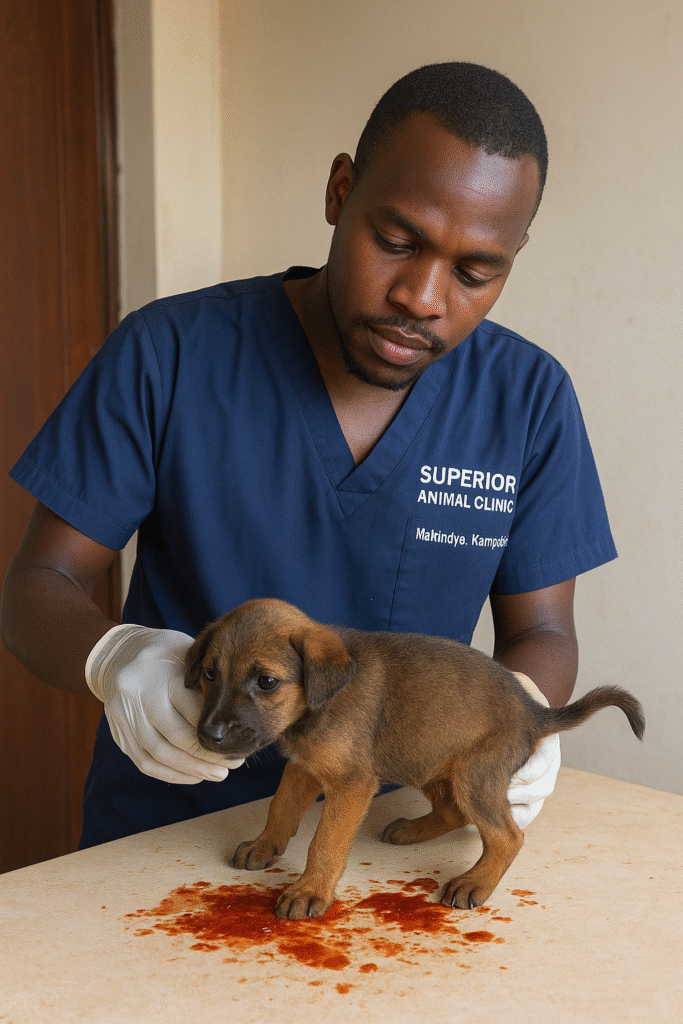
🐾 Key Takeaway
Caring for a dog with canine distemper requires patience, consistency, and professional support.
With timely treatment and proper home care, many dogs recover completely and go on to live normal, happy lives.
If you ever feel unsure about what to do, call or visit Superior Animal Clinic, Salaama Road, Makindye, Kampala — we’ll walk with you every step of the way.
🚨 What Happens If You Don’t Treat Canine Distemper?
Untreated distemper can lead to:
- Permanent brain and nerve damage
- Blindness, seizures, or paralysis
- Death, especially in puppies
Early treatment at Superior Animal Clinic dramatically improves recovery chances.
🐕 Dogs Most Prone to Canine Distemper in Uganda
- Puppies below 6 months (unvaccinated)
- Rescue or street dogs
- Dogs living in poor hygiene conditions
- Breeds with weaker immune systems like Huskies and Labradors in hot climates
Best Ways to Prevent Canine Distemper in Dogs in Uganda
Canine distemper is highly contagious but 100% preventable with the right care and vaccinations. Prevention is always easier (and cheaper) than treatment — especially in Uganda, where the virus spreads quickly through unvaccinated street dogs and stray puppies.
At Superior Animal Clinic, we’ve helped hundreds of dog owners across Kampala protect their pets from distemper.
Here’s how you can do the same.
💉 1. Vaccinate Your Dog on Time
The distemper vaccine is your dog’s strongest defense. Puppies should receive their first shot at 6–8 weeks old, followed by booster vaccines every 3–4 weeks until 16 weeks of age.
After that, your dog needs annual boosters to stay protected for life.
At Superior Animal Clinic, we offer:
- Puppy vaccination packages
- Affordable distemper boosters for adult dogs
- Reminders and vaccination cards for every visit
👉 Never skip or delay vaccines — even one missed booster can leave your dog exposed.
2. Keep Unvaccinated Dogs Away
Avoid letting your vaccinated dog interact with stray dogs or unvaccinated puppies — especially in public places like markets, compounds, or parks.
The virus spreads through:
- Coughing and sneezing
- Shared food/water bowls
- Contaminated clothes, shoes, or hands
If you’ve been around other dogs, always wash your hands and shoes before handling your own pet.
3. Maintain a Clean and Safe Environment
Good hygiene reduces the spread of infection.
Disinfect your dog’s:
- Feeding and water bowls
- Bedding
- Kennel area
Use mild disinfectants or diluted bleach solutions.
At home or kennels in Kampala’s humid climate, bacteria and viruses multiply fast — daily cleaning goes a long way in prevention.
4. Feed a Balanced Diet to Boost Immunity
Healthy dogs fight off infections more easily.
Feed high-quality meals rich in protein, vitamins, and minerals — like boiled chicken, rice, liver, or vet-approved dog food.
Add supplements like multivitamins and immune boosters (available at Superior Animal Clinic) to strengthen resistance against viruses like distemper.
5. Practice Good Hygiene After Walks or Boarding
If your dog visits grooming salons, boarding centers, or plays with other dogs, always:
- Bathe or wipe them down after visits
- Clean paws before entering the house
- Ensure kennels and salons require vaccination proof before allowing contact
We recommend choosing vet-approved boarding facilities to minimize risk.
6. Isolate New or Sick Dogs
When you bring a new dog home, isolate it for 2 weeks before introducing it to others.
During that time, your vet can check vaccination records and run tests if necessary.
This simple step can prevent mass infection in multi-dog homes or kennels.
7. Schedule Regular Vet Checkups
Early detection saves lives. Regular health checkups every 6–12 months help catch infections or weak immunity early.
At Superior Animal Clinic, we provide:
- Routine distemper antibody tests
- Vaccination updates
- Full physical exams to ensure your dog stays healthy year-round
8. Educate Fellow Pet Owners
Spread awareness in your community — especially in neighborhoods where stray dogs and unvaccinated pets are common.
Encourage friends, neighbors, and breeders to vaccinate their dogs.
The more dogs are vaccinated, the safer all dogs in Kampala become.
🐾 Key Takeaway
The best protection against canine distemper in Uganda is responsible pet care and timely vaccination.
Don’t wait until symptoms appear — prevention costs far less than treatment and saves your dog’s life
💰 Cost of Treating and Preventing Canine Distemper in Uganda
Many dog owners in Kampala ask us, “How much does it cost to treat canine distemper in Uganda?” or “Is it cheaper to vaccinate my dog instead?”
The honest answer is — prevention is always far more affordable than treatment.
At Superior Animal Clinic, Makindye, we understand that every pet owner wants the best care for their dog without breaking the bank. Let’s break down the costs so you know what to expect.
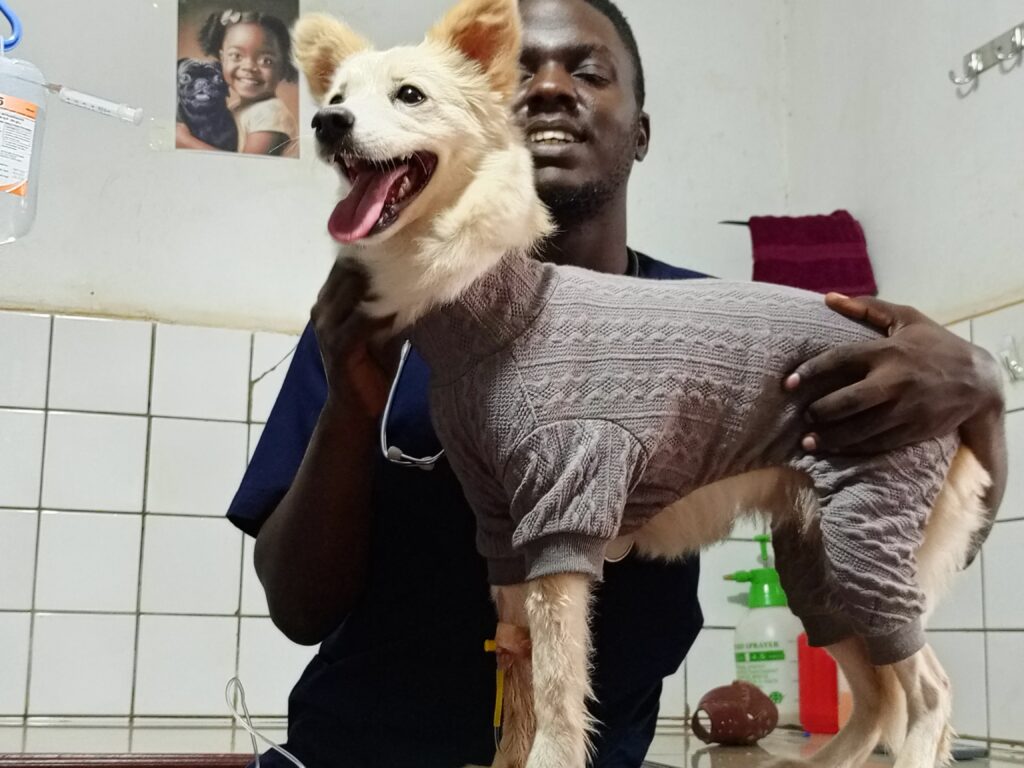
💉 1. Cost of Preventing Canine Distemper (Vaccination & Checkups)
Preventing distemper through vaccination is the smartest and most affordable option.
Here’s what most dog owners in Kampala can expect:
| Service | Average Cost (UGX) | Frequency |
| Puppy Distemper Vaccination (1st Dose) | 60,000 – 80,000 | 6–8 weeks old |
| Booster Vaccinations | 60,000 – 80,000 per shot | Every 3–4 weeks until 16 weeks |
| Adult Dog Annual Booster | 80,000 – 100,000 | Once a year |
| Full Puppy Vaccination Package (All Core Vaccines) | 200,000 – 300,000 | Once |
| Routine Vet Checkup | 30,000 – 50,000 | Every 6–12 months |
💡 Tip: When you vaccinate your dog at Superior Animal Clinic, you also get a free health record card, vaccination reminders, and personalized guidance on nutrition and parasite control.
🏥 2. Cost of Treating Canine Distemper in Uganda
Once a dog develops distemper, treatment becomes more intensive and expensive, depending on how early the disease is detected.
| Treatment Type | Estimated Cost (UGX) | Duration |
| Initial Diagnosis & Consultation | 30,000 – 60,000 | One-time |
| Blood Tests, Distemper Test, & Lab Work | 80,000 – 150,000 | One-time |
| Hospitalization (for Severe Cases) | 30,000 per day | Depends on recovery |
| IV Fluids & Supportive Care | 50,000 – 80,000 per day | 5–10 days |
| Antibiotics & Immune Boosters | 60,000 – 120,000 | Varies |
| Neurological & Symptom Management Drugs | 70,000 – 150,000 | Varies |
💬 On average, full treatment may cost anywhere between 125,000 and 4500,000 UGX, depending on the dog’s condition and how long hospitalization is needed.
🧩 Prognosis (Recovery and Outcome)
With timely and professional care, many dogs recover fully. However, neurological symptoms can persist in severe cases. Dogs that survive distemper often build lifelong immunity against it.
FAQs About Canine Distemper in Dogs – Kampala, Uganda
1. What is canine distemper in dogs?
Canine distemper is a highly contagious viral disease that affects dogs’ respiratory, digestive, and nervous systems. It is caused by the Canine Distemper Virus (CDV) and is very common among unvaccinated dogs in Kampala and across Uganda.
2. What are the early signs of canine distemper in dogs?
Early symptoms include eye and nose discharge, coughing, fever, vomiting, diarrhea, loss of appetite, and lethargy. If your dog shows any of these signs, visit Superior Animal Clinic in Makindye immediately for a full check-up and testing.
3. How do I know if my dog has canine distemper?
You can only be sure through a veterinary diagnosis. At Superior Animal Clinic, our vets use clinical exams and lab tests to confirm the presence of distemper and rule out other infections like parvovirus or kennel cough.
4. Canine distemper treatment near me — where can I take my dog in Kampala?
The best veterinary clinic for canine distemper treatment near you is Superior Animal Clinic, located along Salaama Road, Makindye. We serve pet owners from Ntinda, Nsambya, Katwe, Muyenga, Munyonyo, Bugolobi, Rubaga, and beyond, offering expert care and affordable treatment.
5. How much does canine distemper treatment cost in Uganda?
At Superior Animal Clinic, treatment costs vary based on severity but typically range between UGX 125,000 to UGX 450,000. This includes medical care, fluid therapy, immune boosters, and follow-up monitoring.
6. Can canine distemper be cured?
There is no specific cure for the virus itself, but with timely treatment and supportive care at Superior Animal Clinic, most dogs recover fully. Early intervention greatly improves survival chances.
7. Can vaccinated dogs still get canine distemper?
While rare, it can happen if the dog missed booster shots or if vaccines were not stored properly. We recommend annual vaccinations at Superior Animal Clinic to keep your dog fully protected.
8. What is the best vet for canine distemper treatment in Kampala?
The best vet clinic in Kampala for diagnosing and treating canine distemper is Superior Animal Clinic, Makindye. Our experienced veterinarians provide advanced medical care, isolation facilities, and personalized treatment for every dog.
9. What are the stages of canine distemper in dogs?
Canine distemper typically progresses in three main stages:
1️⃣ Respiratory Stage – coughing, sneezing, nasal discharge.
2️⃣ Gastrointestinal Stage – vomiting, diarrhea, weight loss.
3️⃣ Neurological Stage – twitching, seizures, paralysis.
Visit Superior Animal Clinic early for the best outcome.
10. Can I treat canine distemper at home?
No, canine distemper needs professional veterinary care. However, home care like hydration, warmth, and soft food, can support recovery. Always seek medical help first from Superior Animal Clinic.
11. What is the best food for dogs with canine distemper?
Dogs with distemper need soft, nutrient-rich, and easily digestible meals such as:
- Boiled chicken, rice, and pumpkin
- Bone broth or chicken soup
- Vitamin-rich supplements
Our vets at Superior Animal Clinic can guide you on a custom diet plan.
12. What happens if I don’t treat canine distemper?
Untreated distemper can cause brain damage, paralysis, blindness, and death, especially in puppies. Early diagnosis and treatment at Superior Animal Clinic can save your dog’s life.
13. Is canine distemper contagious to humans or other pets?
It’s not contagious to humans, but it can spread easily among dogs and wild animals through coughing, sneezing, or shared food/water bowls.
14. How can I prevent canine distemper in my dog?
- Vaccinate your dog regularly.
- Avoid contact with unvaccinated or stray dogs.
- Keep your dog’s environment clean.
- Visit Superior Animal Clinic for yearly health checks.
15. Which dogs are most at risk of getting canine distemper?
- Unvaccinated puppies under 6 months.
- Rescue or street dogs.
- Dogs in crowded kennels or shelters.
- Breeds with weaker immune systems in hot climates, such as Huskies and Labradors.
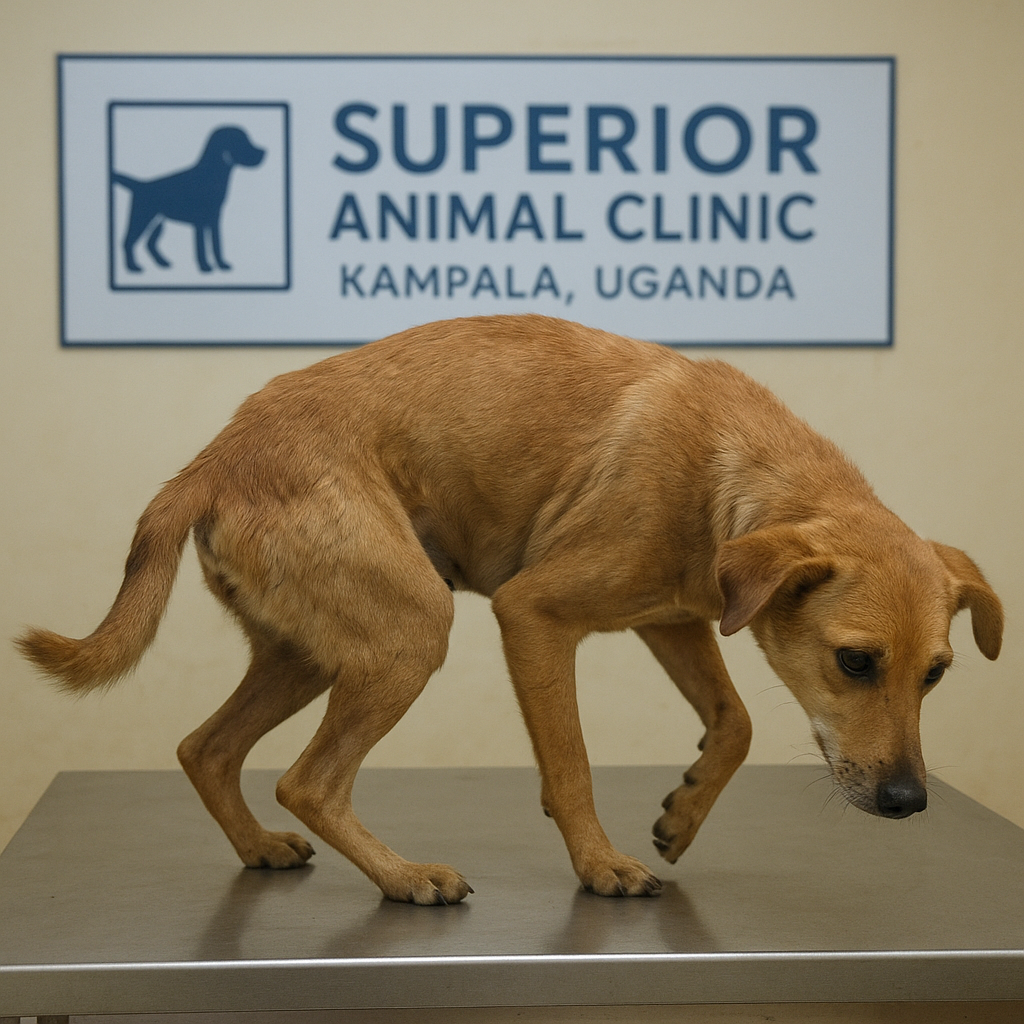
16. Where is canine distemper most common in Kampala?
Distemper cases are most reported in:
- Makindye, Nsambya, Katwe, and Rubaga – due to high stray dog populations.
- Muyenga, Munyonyo, and Bugolobi – among imported or newly adopted dogs.
- Ndejje, Zana, and Mityana – due to limited vaccination coverage.
17. Can a dog recover from canine distemper?
Yes. With prompt veterinary treatment, strong nutrition, and proper care, dogs can recover and develop lifelong immunity against the virus. The recovery process may take several weeks to months.
18. What are the neurological signs of canine distemper?
When the virus affects the brain and spinal cord, you may see:
- Muscle twitching
- Seizures
- Head tilt or circling
- Sudden paralysis
If you notice these, visit Superior Animal Clinic immediately.
19. What are the best drugs for canine distemper in Uganda?
Treatment usually includes:
- Broad-spectrum antibiotics to prevent bacterial infections
- Vitamin supplements and immune boosters
- Anticonvulsants for seizure control
- Fluids and electrolytes for dehydration
Our veterinarians at Superior Animal Clinic carefully tailor medications based on your dog’s condition.
20. How long does canine distemper last in dogs?
The illness can last 2 to 8 weeks, depending on the severity and treatment. Some dogs recover fully, while others may develop chronic neurological issues if not treated early.
21. What home remedies can help a dog with canine distemper?
Home remedies can support recovery but not replace treatment.
Try:
- Keeping your dog warm and hydrated
- Offering chicken broth or glucose water
- Cleaning eye/nose discharge with a warm cloth
Always combine this with professional treatment at Superior Animal Clinic.
22. When should I take my dog to the vet for possible distemper?
If your dog has runny eyes/nose, coughing, diarrhea, seizures, or weakness, take them to a vet immediately. The earlier you visit Superior Animal Clinic, the higher your dog’s chance of recovery.
23. How can I book an appointment for canine distemper treatment in Kampala?
You can visit or call Superior Animal Clinic, located along Salaama Road, Makindye, Kampala.
We serve all surrounding neighborhoods including Ntinda, Katwe, Nsambya, Munyonyo, Rubaga, Muyenga, Nakawa, and Ndejje.
📞 Call now to book your appointment and save your dog’s life.
❤️ Why Choose Superior Animal Clinic, Makindye for Canine Distemper Treatment?
- 🩺 Experienced Veterinarians specialized in infectious dog diseases.
- 💉 Advanced diagnostics & isolation wards for safety.
- 🐾 Affordable, compassionate, and 24/7 emergency care.
- 🌍 Serving all areas — Ntinda, Nsambya, Katwe, Makindye, Muyenga, Munyonyo, Bugolobi, Rubaga, Lubowa, Kololo, and beyond.
We’re not just a vet clinic — we’re your dog’s health partner.
📞 Call or visit Superior Animal Clinic today on Salaama Road, Makindye, Kampala, for expert canine distemper treatment and full vaccination services.

I tried jljl1login out the other day, and honestly, it’s alright. Nothing groundbreaking, but it works. Could use a faster loading time, though.
Thank you for your sharing. I am worried that I lack creative ideas. It is your article that makes me full of hope. Thank you. But, I have a question, can you help me?